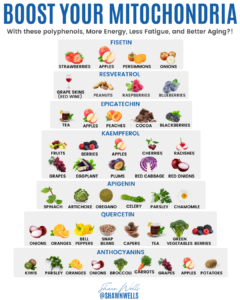How to Strengthen Your Mitochondria for Lasting Energy & Health

Ever feel like you’re running on empty, even after a full night’s sleep? Maybe your brain feels foggy, your metabolism is sluggish, or workouts leave you more drained than refreshed. The culprit might be something you haven’t given much thought to—your mitochondria function.
Most people know mitochondria as the “powerhouse of the cell”, but what does that actually mean for your energy, metabolism, and overall health? More importantly, how can you repair mitochondria naturally and keep them functioning optimally?
In this article, I’ll break down the essential role of mitochondria in your body, how to recognize when they need help, and the most effective strategies to restore and strengthen them naturally.
What Is Mitochondria and Its Function?
Mitochondria are tiny organelles found in nearly every cell of your body. Their primary job? Energy production. These structures take the oxygen you breathe and the nutrients you eat and convert them into adenosine triphosphate (ATP)—the fuel your body runs on.
But that’s just the start. The mitochondria function extends far beyond ATP production. These cellular powerhouses also:
- Regulate metabolism and fat-burning
- Support brain function by providing energy to neurons
- Control oxidative stress and reduce inflammation
- Influence aging and cellular repair
- Maintain immune health by regulating cell signaling
Understanding mitochondria structure and function helps explain why mitochondrial dysfunction can leave you feeling exhausted, foggy, and more prone to illness.
Mitochondria Structure & Location in Cells
Mitochondria aren’t just randomly floating inside your cells—they have specific locations and functions that vary depending on the tissue. For example, muscle and brain cells have higher concentrations of mitochondria because they demand more energy.
Looking at a mitochondria diagram, you’ll see that their structure includes:
- An outer membrane that acts as a protective barrier
- An inner membrane where energy production happens
- Cristae (folds in the inner membrane) that increase surface area for ATP production
- Matrix (the core of the mitochondria), which contains enzymes for breaking down nutrients
This cell and mitochondria relationship is crucial because when mitochondria are damaged, every function in your body suffers.
Signs Your Mitochondria Need Help
How do you know if your mitochondria function isn’t optimal? Here are five warning signs you shouldn’t ignore:
1. You’re Always Tired (Even After Sleeping Well)
If your cells can’t produce enough ATP, you’ll feel drained no matter how much rest you get.
2. Brain Fog and Poor Concentration
Since your brain cells rely on mitochondria for energy, dysfunctional mitochondria can cause mental fatigue, forgetfulness, and difficulty focusing.
3. Struggling with Weight Loss
A sluggish metabolism and poor cellular mitochondria function can make it harder to burn fat, even if you’re eating well and exercising.
4. Muscle Weakness and Poor Exercise Recovery
Mitochondria power your muscles. If they’re not functioning properly, you may experience muscle fatigue, slow recovery, and reduced endurance.
5. Premature Aging and Chronic Inflammation
Mitochondria help control oxidative stress and inflammation, both of which accelerate aging and increase disease risk.
If these symptoms sound familiar, your mitochondria might need serious support.
Everyday Habits That Harm Your Mitochondria
Before we talk about how to repair mitochondria naturally, let’s look at what’s damaging them in the first place.
1. High Sugar and Processed Food Intake
Excess sugar and processed foods increase oxidative stress, leading to mitochondrial damage. Research has linked high sugar diets to mitochondrial dysfunction and metabolic disorders.
2. Chronic Stress and Poor Sleep
Stress increases cortisol levels, which can interfere with mitochondria function. And since mitochondria repair themselves during sleep, poor sleep quality leads to further damage.
3. Lack of Physical Activity
Exercise is one of the most powerful ways to increase mitochondria. Being sedentary reduces mitochondrial efficiency and makes fatigue and sluggish metabolism worse.
4. Exposure to Environmental Toxins
Pesticides, heavy metals, and pollution damage DNA in mitochondria, leading to long-term dysfunction.
How to Repair Mitochondria Naturally
Now that we’ve covered what’s harming your mitochondria function, let’s focus on how to restore and optimize them naturally. Supporting mitochondrial health doesn’t require drastic changes—small, strategic shifts in your diet, exercise, and lifestyle can make a significant difference.
By improving how your mitochondria produce energy, you can boost metabolism, enhance brain function, and increase endurance—all while slowing the aging process. Here’s how to do it.
1. Eat for Stronger Mitochondria
What you eat directly impacts your mitochondria function. Certain nutrients fuel ATP production and help mitochondria repair themselves, while others—like processed foods and excess sugar—cause oxidative stress and damage.
Best Foods for Mitochondria Health
- Healthy Fats for Mitochondrial Membranes
Mitochondria have delicate membranes that require healthy fats to function efficiently. Prioritize:
- Avocados
- Extra virgin olive oil
- Wild-caught fish (salmon, sardines, mackerel)
- Nuts and seeds (walnuts, chia, flaxseeds)
- Antioxidant-Rich Foods to Reduce Oxidative Stress
Mitochondria produce free radicals during energy production. To prevent oxidative damage, include:
- Berries (blueberries, raspberries, blackberries)
- Dark leafy greens (spinach, kale, Swiss chard)
- Dark chocolate (high cacao content)
- Protein and Amino Acids for Mitochondrial Repair
Mitochondria rely on L-carnitine and CoQ10 to generate energy. Get these from:
- Grass-fed beef
- Pasture-raised eggs
- Wild-caught fish
- Intermittent Fasting (IF) for Mitochondrial Biogenesis
Short fasting periods trigger mitochondrial biogenesis, where your body creates new mitochondria to meet energy demands. A 12- to 16-hour fast a few times per week can improve mitochondrial efficiency.
2. The Best Exercise to Increase Mitochondria
Mitochondria thrive on movement. When you exercise, your body signals cells to create more mitochondria, increasing energy production and endurance.
Best Workouts for Mitochondrial Function
- High-Intensity Interval Training (HIIT)
Short bursts of intense movement followed by rest stimulate mitochondrial growth, improving energy levels. - Zone 2 Cardio (Moderate-Intensity Exercise)
Steady, moderate workouts like brisk walking or cycling enhance mitochondrial function and oxygen utilization. - Strength Training
Lifting weights signals the body to produce more mitochondria, improving overall metabolic health.
A mix of HIIT, resistance training, and Zone 2 cardio each week is ideal for sustaining mitochondrial health.
3. Reduce Stress and Improve Sleep
Chronic stress and poor sleep destroy mitochondrial efficiency. Since mitochondria repair themselves at night, low-quality sleep leads to long-term energy depletion.
Mitochondria-Friendly Stress & Sleep Tips
- Breathwork & Meditation: Reduces cortisol levels, protecting mitochondria.
- Nature Walks: Lowers inflammation and enhances cellular mitochondria health.
- Prioritize Deep Sleep: Aim for 7-9 hours of quality sleep to support mitochondrial repair.
4. Mitochondrial Support: Science-Backed Supplements
While lifestyle shifts are foundational, certain mitochondria-supporting supplements can help enhance ATP production, reduce oxidative stress, and promote mitochondrial repair.
Here are a few that I personally trust for their quality and effectiveness:
- CoQ10 (Coenzyme Q10) – Essential for ATP production and cardiovascular support.
- Recommended: NOW Foods CoQ10 (200 mg) or Doctor’s Best High Absorption CoQ10
- NAD+ Precursors (NMN or NR) – Help restore cellular energy and mitochondrial function.
- Recommended: Peak Performance Nicotinamide Riboside or NatureBell NAD+ Complex
- Alpha-Lipoic Acid & Acetyl-L-Carnitine – Support fat metabolism and mitochondrial repair.
- PQQ (Pyrroloquinoline Quinone) – Stimulates mitochondrial biogenesis and promotes new mitochondria growth.
- Recommended: Toniiq Ultra High Purity PQQ or Nutricost PQQ (20 mg)
- Omega-3 Fatty Acids – Strengthen mitochondrial membranes and reduce inflammation.
These aren’t quick fixes, but when combined with a nutrient-dense diet, movement, and stress management, they can help optimize mitochondrial efficiency and support long-term energy production.
Important Note: While these supplements can support mitochondrial health, it’s always best to consult with a healthcare professional before starting any new supplement regimen—especially if you have existing medical conditions or are taking medications.
Common Myths About Mitochondria and Energy
There’s a lot of misinformation about energy and mitochondria. Let’s clear up some common myths.
Myth #1: “I just need more caffeine to boost energy.”
Caffeine stimulates the nervous system but doesn’t fix mitochondrial dysfunction. Relying on it burns out mitochondria over time.
Myth #2: “Only older adults need to worry about mitochondrial health.”
Mitochondria function starts declining in your 30s and 40s due to stress, poor diet, and inactivity—not just aging.
Myth #3: “Supplements alone can fix energy issues.”
Supplements help, but they don’t replace good nutrition, movement, and sleep.
Final Thoughts: Take Back Your Energy
Your mitochondria function determines how you feel—your energy levels, metabolism, brain clarity, and even how well you age. By making small, intentional changes, you can repair and rebuild your mitochondria naturally, leading to better energy, sharper focus, and a healthier body.
If you’ve been feeling drained, foggy, or struggling with metabolism, this is your wake-up call. Start with one simple change today—your mitochondria (and your future self) will thank you.
I share weekly science-backed, actionable insights on how to optimize your energy, metabolism, and overall well-being. If you want to stay ahead with the latest health strategies, join my newsletter—you’ll get practical tips, research-backed advice, and exclusive updates straight to your inbox.
References
Anderson, R. M., & Weindruch, R. (2012). The caloric restriction paradigm: Implications for healthy human aging. American Journal of Human Biology, 24(2), 101-106.
Burtscher, J., Zangrandi, L., Schwarzer, C., & Gnaiger, E. (2022). Mitochondria: The powerhouse of the cell is also the Achilles’ heel of cancer cells. Frontiers in Physiology, 13, 820482.
Diniz, M. S., Tocantins, C., Grilo, L. F., & Pereira, S. P. (2022). The bitter side of sugar consumption: a mitochondrial perspective on diabetes development. Diabetology, 3(4), 583-595.
Gorman, G. S., Schaefer, A. M., Ng, Y., Gomez, N., Blakely, E. L., Alston, C. L., … & Turnbull, D. M. (2015). Prevalence of nuclear and mitochondrial DNA mutations related to adult mitochondrial disease. Annals of Neurology, 77(5), 753-759.
Hood, D. A., Memme, J. M., Oliveira, A. N., & Triolo, M. (2019). Maintenance of skeletal muscle mitochondria in health, exercise, and aging. Annual Review of Physiology, 81, 19-41.
Jornayvaz, F. R., & Shulman, G. I. (2010). Regulation of mitochondrial biogenesis. Essays in Biochemistry, 47, 69-84.
Lanza, I. R., & Nair, K. S. (2010). Mitochondrial function as a determinant of life span. Pflugers Archiv – European Journal of Physiology, 459(2), 277-289.
Liesa, M., Palacín, M., & Zorzano, A. (2009). Mitochondrial dynamics in mammalian health and disease. Physiological Reviews, 89(3), 799-845.
Rosenberg, I. H. (2012). Effects of diet and exercise on mitochondrial metabolism and aging. Aging Cell, 11(5), 771-777.
Vina, J., Sanchis-Gomar, F., Martinez-Bello, V. E., & Gomez-Cabrera, M. C. (2009). Exercise acts as a drug; the pharmacological benefits of exercise. British Journal of Pharmacology, 167(1), 1-12.
Wallace, D. C. (2012). Mitochondria and cancer. Nature Reviews Cancer, 12(10), 685-698.
Share
Who is Shawn Wells?
Although I’ve suffered from countless issues, including chronic pain, auto-immunity, and depression, those are the very struggles that have led me to becoming a biochemist, formulation scientist, dietitian, and sports nutritionist who is now thriving. My personal experiences, experiments, and trials also have a much deeper purpose: To serve you, educate you, and ultimately help you optimize your health and longevity, reduce pain, and live your best life.
ORDER THE ENERGY FORMULA
Discover the 6 foundational pillars to cultivate a more caring, compassionate, connected, unified and purpose-filled life.





